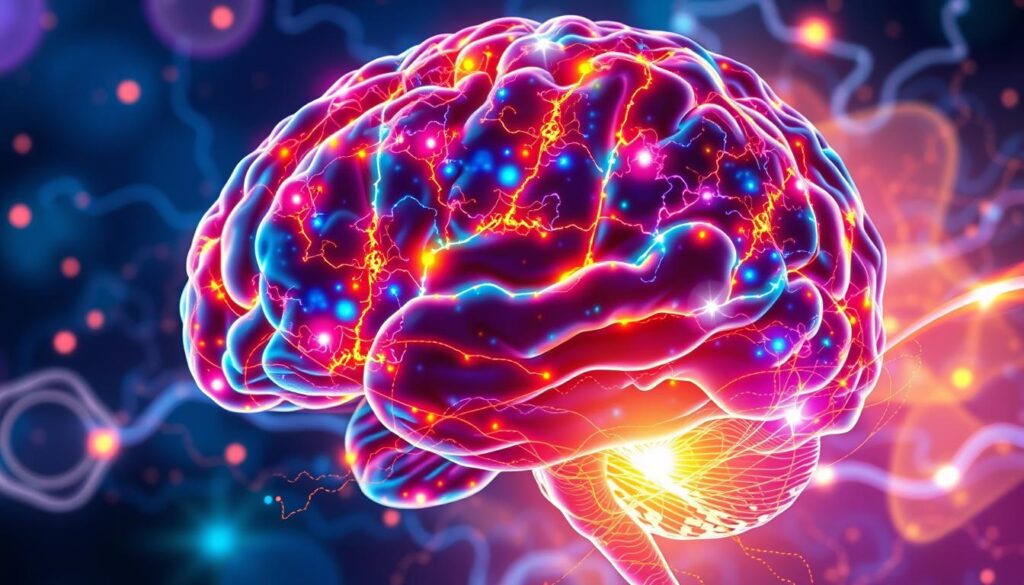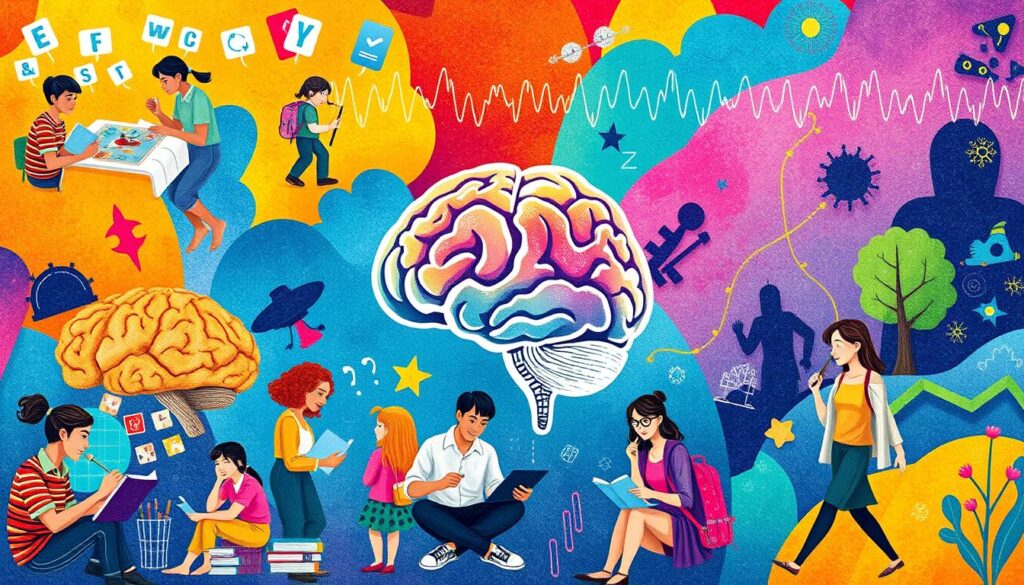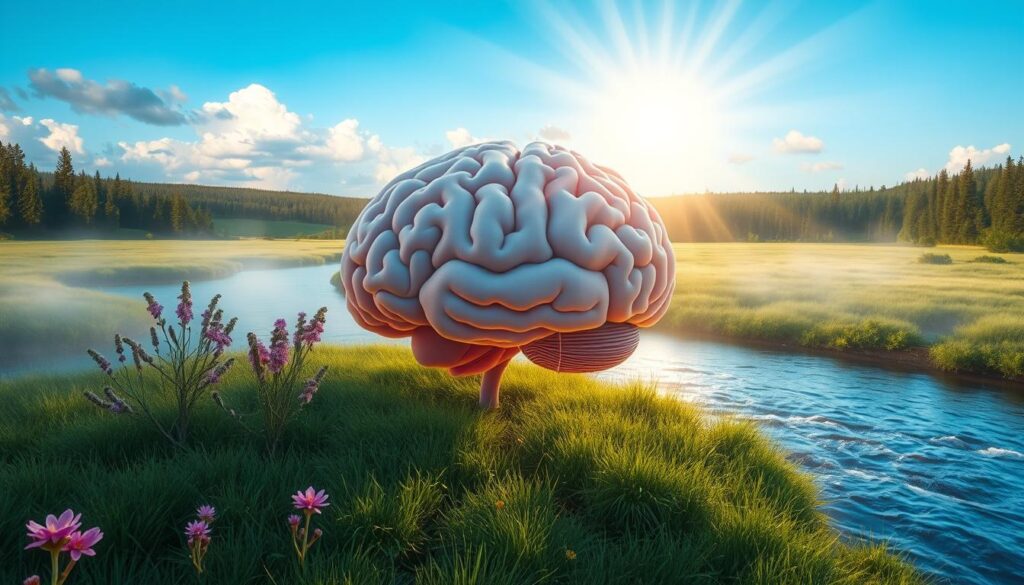Simple Ways to Support Your Brain Health Today
Did you know up to 40% of dementia cases could be prevented? This is by making lifestyle changes. Taking steps to support your brain health can lower your risk of cognitive decline as you age.
By making simple changes to your daily routine, you can nourish and stimulate your brain. This helps it thrive.
This post contains affiliate links. If you purchase through these links, I may earn a small commission at no extra cost to you. Learn more here.
Key Takeaways
- Challenging your mind through education and new skill-building can improve brain function.
- Regular physical exercise boosts blood flow and oxygen to the brain, supporting cognitive performance.
- Eating a brain-healthy diet rich in antioxidants, omega-3s, and other nutrients can protect neural pathways.
- Getting adequate, high-quality sleep is key for memory consolidation and brain repair.
- Actively managing stress and protecting your head from injury are important for preserving brain health.
Understanding Brain Health and Cognitive Function
Your brain is small, just 3 pounds, but it controls everything. It handles your thoughts, movements, and feelings. Knowing how your brain works is key to staying sharp as you get older.
The Role of Neurons in Brain Function
Neurons are the brain’s building blocks. They help your brain talk to your body. The more connections they make, the better you can learn and remember.
How Cognitive Decline Affects Mental Performance
As you age, your brain might change a bit. You might think slower or forget things. But serious brain problems can really hurt your thinking. Spotting these problems early can help keep your brain healthy.
The Science of Neuroplasticity
Your brain can change and grow, thanks to neuroplasticity. This means you can learn new things and even heal from injuries. Knowing about neuroplasticity helps you keep your brain strong.

“The brain has the remarkable power to change and adapt, even in old age.”
Physical Exercise: Your Brain’s Best Friend
Physical exercise is great for your brain. It helps your brain stay healthy and sharp. It also makes you feel better overall.
Studies show that exercise starts to help your mood after just 10 minutes. After 20 minutes, you feel even better. It also helps reduce stress and anxiety.
Even a little bit of exercise is good. Dancing, walking, or playing tennis can make your brain work better. It helps with learning and feeling happy.
- Aim for at least 150 minutes of moderate aerobic activity or 75 minutes of vigorous aerobic activity per week for optimal brain health.
- Incorporate strength training twice a week with 1 set per muscle group and 8-12 repetitions.
- Include flexibility exercises 3-5 times per week, with each session lasting 10 minutes.
- Balance exercises should be done 2-3 days a week.
Regular exercise is key for a healthy brain. It boosts your mental clarity and keeps your mind sharp.

“Exercise is considered a form of self-love that strengthens the bond between mind and body, leading to more present, joyful, and grateful living.”
Nutrition Strategies for Optimal Brain Performance
Eating well is key for a healthy brain. Adding brain-boosting foods to your diet helps your brain work better. It also improves your focus.
Brain-Boosting Foods and Nutrients
Some foods are great for your brain. Fatty fish like salmon have omega-3s that help your heart and brain. Blueberries are full of antioxidants that boost brain function.
Leafy greens like spinach are good for your brain too. They help keep your brain sharp. Other foods like walnuts and coffee also help your brain.
In addition to fatty fish and blueberries, supplements like Moringa Magic can provide a concentrated source of brain-boosting nutrients. Packed with antioxidants, vitamins, and minerals, Moringa Magic supports neural pathways, enhances focus, and aids overall cognitive health.
The MIND Diet Approach
The MIND diet is a mix of Mediterranean and DASH diets. It focuses on plants and healthy foods. It’s good for your brain and can slow down memory loss.
Hydration and Brain Function
Drinking enough water is also important. Dehydration hurts your brain and mood. Drink plenty of water and try brain-boosting supplements like Moringa Magic.

“A healthy diet rich in brain-boosting nutrients can be a powerful tool for maintaining cognitive reserve and supporting long-term brain health.”
Good nutrition and staying hydrated boost your brain. A balanced diet is the best way to keep your brain healthy and sharp.
Quality Sleep: The Foundation of Brain Health
Getting enough sleep is key for a healthy brain. Your brain needs rest to remember things, feel emotions, and stay sharp. Good sleep habits help you stay focused and clear-minded.
Adults should sleep 7-9 hours each night. Babies and young kids sleep a lot, up to 18 hours a day. School kids and teens need about 9.5 hours. But, many people don’t get enough sleep because of work and fun activities.
It’s not just how long you sleep that matters. Sleep quality is also important. Sleep problems like sleep apnea can harm your brain. These issues can lead to memory loss and should be checked by a doctor.
“Restoring adequate sleep after sleep deprivation can lead to improved mood, increased energy and attention, reduced risk of car accidents and improved overall well-being.”
To keep your brain healthy, sleep regularly and create a calm bedtime routine. Make your bedroom sleep-friendly. Avoid screens before bed and exercise often for better sleep.
Your brain works best when you sleep well. By valuing rest and good sleep habits, you can use your brain’s full power. You’ll feel sharp and focused.

| Sleep Duration Recommendations | Age Group |
|---|---|
| 16-18 hours per day | Newborns |
| Around 9.5 hours per night | School-age children and teens |
| 7-9 hours per night | Adults |
Mental Stimulation and Brain Fitness
Keeping your brain active is key to staying sharp. Doing fun brain games can boost your brain fitness and concentration. It also makes you feel better mentally. Try puzzles, learn new things, and keep your brain happy.
Brain Training Activities
Challenging your brain makes it strong and flexible. Puzzles, Sudoku, and brain teasers are great. They help with memory and solving problems.
Doing jigsaw puzzles can protect your brain as you age. Playing card games can make your brain bigger in some areas.
Learning New Skills for Cognitive Enhancement
Learning something new is good for your brain. It could be music, a language, or painting. Your brain makes new paths and gets better at handling new things.
The Power of Social Engagement
Being social is good for your brain. Volunteer, join clubs, or do community stuff. It keeps your mind sharp and fights loneliness.
Studies show happy music can make you more creative. This shows how good being social is for your brain.
Adding fun brain games to your life is smart. It boosts your brain fitness, concentration, and overall brain health. Use mindfulness techniques to keep your mind sharp.

Stress Management for Neural Protection
Too much stress is bad for your brain. It can hurt your memory and slow down your brain. To keep your brain healthy, try mindfulness, relaxation, and balance in your life.
Stress can make you more likely to get diseases like dementia. It can also make your brain foggy and hard to focus. This can make it hard to make decisions and finish tasks.
Find out what stresses you and how to handle it. Doing brain-stimulating activities like puzzles can help. Eating well, exercising, and sleeping enough also helps manage stress.
Try deep breathing, tai chi, yoga, or mindfulness to relax. These can help your brain stay healthy and strong.
“Stress is a normal psychological and physical reaction to the demands of life. Chronic stress over time can lead to serious health problems.”
Make stress management a priority. Use mindfulness every day. This will keep your brain healthy and sharp for a long time.

| Stress Symptoms | Impact on Brain Health |
|---|---|
| Cognitive signs: brain fog, difficulty making decisions, trouble completing tasks, inability to concentrate | Chronic stress can lead to inflammation and dysfunction in the brain, affecting mood and memory |
| Emotional signs: anxiety, depression, nervousness, feeling overwhelmed, irritability, negative outlook, trouble regulating emotions | Prolonged exposure to stress hormones increases the risk of developing neurological conditions, such as dementia, depression, headaches, migraines, and stroke |
| Physical signs: headaches, muscle tension or pain, fatigue, difficulty sleeping, stomach problems | Chronic stress can accelerate brain aging, increase the risk of neurodegenerative diseases, and worsen age-related cognitive decline |
Safety First: Preventing Brain Injury
Keeping your brain safe is very important. Brain injuries can cause big problems. They can affect how you think, move, and feel for a long time. By using neuroprotective strategies, you can lower the chance of getting hurt. This helps keep your brain fitness strong.
Protective Measures in Daily Activities
Adding simple safety steps to your day can help a lot. Always wear a seatbelt when you drive. Make sure kids are in the right car seat or booster seat. Also, watch out for dangers at home like slippery floors and dark stairs.
Fixing these problems can help prevent brain injuries.
Sports Safety and Head Protection
Playing sports is good for your brain, but safety comes first. Always wear the right helmet for your sport. This includes helmets for biking, skiing, and sports like football. Following safety rules helps avoid brain injuries.

“Protecting your brain should be a top priority. By taking proactive steps to prevent head injuries, you can safeguard your long-term cognitive health and well-being.”
It’s key to know about neuroprotective strategies and use them every day. Stay careful, wear the right gear, and always put safety first. This keeps your brain healthy and strong.
The Connection Between Heart Health and Brain Function
Your heart and brain are very connected. Heart problems like diabetes and high blood pressure can harm your brain. Taking care of your heart helps keep your brain healthy.
A study from UNC-Chapel Hill and others looked at over 40,000 people in the UK Biobank. They found that heart issues can hurt brain health. They also found that heart problems might cause mental health issues.
Heart and brain health are closely linked. Studies show that many with Alzheimer’s also have heart disease. Experts think that brain problems might not cause memory loss without heart disease.
| Condition | Impact on Brain Health |
|---|---|
| Smoking | Increases the risk of cognitive decline and possibly dementia, but quitting can reduce this risk. |
| Diabetes | Associated with lower cognitive performance and increased risk of dementia. |
| High Blood Pressure | Increased risk of cognitive decline, but treatment may reduce this risk. |
| Obesity | Increases the risk of cognitive decline and could raise the likelihood of dementia. |
Keeping your heart healthy is key to protecting your brain. Regular check-ups and managing health issues are important. A heart-healthy lifestyle also helps your brain stay sharp.
Social Connections and Cognitive Wellness
Keeping strong social ties is key to keeping your mind sharp as you get older. Talking to people often helps fight off sadness and stress. These feelings can hurt your memory and brain health. Doing things in your community, helping out, and being close to family and friends can make your brain healthier. It might even lower the chance of getting dementia.
Benefits of Social Interaction
A study found that being in a relationship or married helps slow down brain decline. Living with others also slows down brain, memory, and language decline. Talking to family, friends, and community groups often helps slow down memory loss.
Community Engagement Activities
- Volunteer work in your local community
- Joining a sports team or recreational club
- Participating in cultural or educational events
- Attending religious or spiritual gatherings
- Engaging in social clubs or hobby groups
Being connected to others can make your heart and brain healthier. It might even lower the risk of diseases like Alzheimer’s. The U.S. Surgeon General’s report shows that being connected helps fight loneliness and isolation.
| Social Engagement Factors | Impact on Cognitive Decline |
|---|---|
| Being in a relationship or married | Slower global cognitive decline |
| Living with others | Slower cognitive, memory, and language decline |
| Weekly interactions with family and friends | Slower memory decline |
| Weekly community group engagement | Slower memory decline |
| Never feeling lonely | Slower global cognitive and executive function decline |
Having a strong social network and getting involved in your community can greatly improve your brain health. By focusing on social connections, you can enjoy many benefits for your mind. This can help you stay sharp and healthy for years to come.
Lifestyle Habits That Harm Brain Health
Your brain is very important. It helps you think, remember, and feel well. But, some habits can hurt your brain. This might make you more likely to get diseases like Alzheimer’s. It’s important to know these habits to keep your brain healthy.
Using harmful substances is bad for your brain. Smoking, drinking too much alcohol, and using illegal drugs can harm your brain. These things can make you forget things and hurt your brain cells.
Stress, not sleeping well, and some medicines can also hurt your brain. Sleep apnea, for example, can make your brain worse. It can make you forget things and feel confused. Also, not taking care of your teeth can hurt your brain too.
But, you can make your brain healthier. Exercise, eating right, managing stress, and staying connected with others can help. These things make your brain strong and healthy.
“Having a sense of purpose in life was one of the strongest predictors of better brain health, associated with a 20% risk reduction in dementia.”
Your brain is very important. Taking care of it with good habits can make you smarter and happier. By taking care of your brain, you can have a sharp mind for a long time.
Natural Approaches to Memory Enhancement
Improving your memory doesn’t need to cost a lot. You can use simple, science-backed ways to help your brain. Try new things, eat right, and you’ll see big changes in how well you remember things.
Fuel Your Brain with the Right Nutrients
What you eat really matters for your memory. Eat foods that are good for your brain like fatty fish, eggs, berries, and leafy greens. These foods are full of nutrients that help your brain work well.
- Fatty fish like salmon, cod, and pollock are full of omega-3s. These help your memory and brain work better.
- Eggs have choline, which is key for memory and learning. Try to eat eggs a few times a week.
- Berries, like blueberries, are full of antioxidants. These protect your brain from harm.
- Leafy greens like spinach and kale are good for your brain. They have lots of vitamins and minerals.
Engage in Regular Physical Activity
Exercise is great for your body and brain. Do at least 150 minutes of moderate exercise or 75 minutes of hard exercise a week. This helps your memory and brain stay sharp.
Prioritize Quality Sleep
Good sleep is key for your brain. Try to sleep 7-9 hours each night. This lets your brain rest and work better.
Challenge Your Brain with New Experiences
Doing new things keeps your brain sharp. Learn something new, play brain games, or try meditation. This keeps your mind active and ready for anything.
By using these natural ways, you can improve your memory without expensive supplements. Focus on healthy habits and watch your memory and brain skills get better.
Conclusion
Keeping your brain healthy is a lifelong journey. It needs many steps. Eating right, exercising, sleeping well, and staying mentally sharp are key. They help your brain work well and might lower disease risks.
Being social and handling stress also helps your brain. These actions make your brain healthier.
Research shows we must act early to protect our brains. This means making choices that help our brains stay sharp. The tips in this article can help you keep your brain in top shape.
It’s always a good time to start caring for your brain. By choosing healthy habits, you can make your brain strong. This leads to a sharper, more resilient mind.






